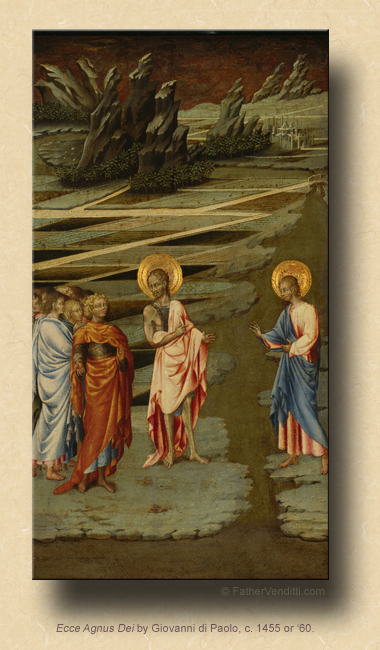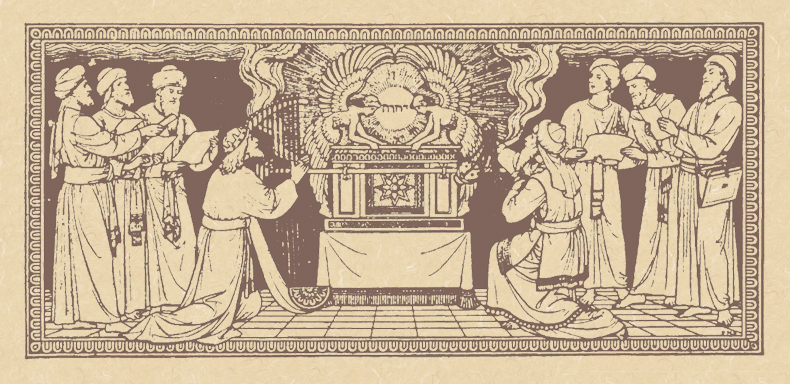Are You Putting Diesel Fuel in a Regular Engine?
The Second Wednesday of Advent.
Lessons from the feria, according to the ordinary form of the Roman Rite:
• Isaiah 40: 25-31.
• Psalm 103: 1-4, 8, 10.
• Matthew 11: 28-30.
FatherVenditti.com
|
9:46 AM 12/10/2014 — I particularly like the way Msgr. Knox has translated the last verses of our first lesson from the Prophet Isaiah:
Youth itself may weaken, the warrior faint and flag, but those who trust in the Lord will renew their strength, like eagles new-fledged; hasten, and never grow weary of hastening, march on, and never weaken on the march (40: 30, 31 Knox).
 This lesson, along with the last verses of our responsorial Psalm, put before us a unique feature of the Dogma of Sufficient Grace, which makes me sound like a broken record, I know, but which is so crucial to understanding our relationship to our Lord. Combine them with today's very brief and beautiful Gospel lesson, which is typically passed over as just a pious platitude—Oh, look how gentle and nice and meek Jesus is—and you have a veritable catechism on the Dogma of Sufficient Grace. This lesson, along with the last verses of our responsorial Psalm, put before us a unique feature of the Dogma of Sufficient Grace, which makes me sound like a broken record, I know, but which is so crucial to understanding our relationship to our Lord. Combine them with today's very brief and beautiful Gospel lesson, which is typically passed over as just a pious platitude—Oh, look how gentle and nice and meek Jesus is—and you have a veritable catechism on the Dogma of Sufficient Grace.
Just to review: what is the Dogma of Sufficient Grace? It is that certain and Divinely revealed teaching of the Church—revealed piecemeal through the Holy Gospels and the Epistles of St. Paul in particular—that our Lord, through His Church, imposes no burden or requirement on us without also providing the Grace—usually through the sacraments, but in other ways as well—to meet those responsibilities successfully. A few examples: the Grace to remain faithful to one's spouse and to raise children in the Faith is given through the sacrament of Holy Matrimony; the Grace to remain faithful to the obligations of the sacramental ministry is given through the sacrament of the Holy Priesthood; the Grace to successfully resist sin in time of temptation is given to all of us through the dual sacraments of Baptism and Confirmation. But, as I've pointed out many times, it's a Dogma of Sufficient Grace, not a dogma of abundant grace; it is tempered by the reality of Original Sin: neither Marriage nor the Holy Priesthood—nor any of the sacraments—has the ability to cancel and make null the concupiscence which is the consequence of Original Sin; even Baptism and Confession, which take away the sin, don't take away the desire to sin again; we all know this from the experience of our own personal struggles with sin. Which means that we do not naturally tend toward goodness; we naturally tend toward evil; that's why there's such a thing as temptation. This is what the Baltimore Catechism called our “fallen nature.” So, the Dogma of Sufficient Grace is not a guarantee that we will be successful in our struggle against sin; it is a guarantee that, if we have properly disposed ourselves to receive Grace, we will succeed—but that's a big “if”.
Grace is kind of like diesel fuel: put diesel fuel in a car with a diesel engine, and it will purr like a top and take you wherever you want to go; but, put diesel fuel in car that runs on regular gasolene, and it's not going anywhere, and not because there's anything wrong with the fuel, but because you put it in a car that wasn't able to burn it. When a marriage falls apart, when a priest deserts his ministry, when any Christian turns away from truth and abandons the Faith, it's not because the Grace to do the right thing wasn't there; it's because the Grace that was given wasn't received properly. God gives the Grace, but providing the right kind of engine to burn the fuel is our responsibility.
But what's the problem with diesel fuel? What's the primary reason everyone doesn't have a diesel car? Diesel fuel is expensive; it costs a good deal more than regular unleaded gasolene. When your car breaks down and needs to be repaired, there's only a handful of mechanics who can fix it for you, and there's a limited number of gas stations where you can buy diesel fuel, anyway. It's inconvenient, just like Grace: we have to struggle, we have to resist, we have to pray, we have to train ourselves to do the right thing every day; and, nine times out of ten, success comes after repeated failures and only after we've made a considerable sacrifice. Not abundant Grace, but Sufficient Grace. In short, we have to carry the Cross of Christ, and bear the burden of a fallen nature.
And now we reach the point where our catechism on the Dogma of Sufficient Grace is completed by today's Gospel lesson:
Come to me, all you that labour and are burdened; I will give you rest. Take my yoke upon yourselves, and learn from me; I am gentle and humble of heart; and you shall find rest for your souls. For my yoke is easy, and my burden is light (Matt. 11: 28-30 Knox).
That was the whole lesson, short and to the point, and not at all contradicting the Dogma of Sufficient Grace; quite the contrary. When one has the humility to accept one's sinfulness—when one imitates the meekness of our Lord, Who, after all, is God; when one abandons the twisted perfectionism rooted in the sin of pride which causes us, whenever we butt heads with the requirements of the Gospel or the Church, to look for a defect in them rather than in ourselves—the result is liberation.
Yes, our Blessed Lord, through his Gospel and through the teaching of His infallible Church, places a yoke on the shoulders of mankind, but this yoke is easy to bear because it liberates us, and the burden does not weigh us down because He Himself carries the heaviest part. For those disposed to receive the Grace of Christ with a generous heart purged from the sin of pride, freedom consists in no longer being responsible ourselves for deciding what's right and what's wrong. That was the sin of Adam and Eve that we call the Original Sin: the sin of deciding for ourselves the difference between right and wrong. Christ takes that decision back away from us, not to enslave us, but to free us, free us from the burden of making ourselves responsible for our own salvation. All we have to do is surrender ourselves to Him.
Merciful and gracious is the Lord [says today's Psalm],
slow to anger and abounding in kindness.
Not according to our sins does he deal with us,
nor does he requite us according to our crimes (Psalm 103: 8, 10 NABRE).*

* This is the verse as it appears in the Roman Missal, identified there as vs. 8 & 10. In reality, it is a combination of vs. 9 & 10 in most other translations.
|

